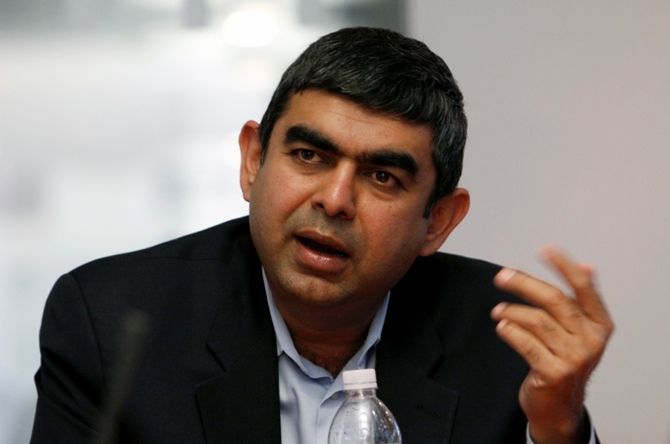 | « Back to article | Print this article |
 Automation, digitisation bigger disruptors than Trump, note ban: Sikka.
Automation, digitisation bigger disruptors than Trump, note ban: Sikka.
Succeed to improve the world, Azim Premji asks staffers.
Infosys chief executive Vishal Sikka has cautioned that the tidal wave of automation and technology-fuelled transformation could make the traditional information technology services obsolete, and asked employees to shift their behaviour to adopt to shifts in technology.
“The mountains ahead are tall ones. There is no other way but to get there and go... if we don’t, we will be made obsolete by the tidal wave of automation and technology-fuelled transformation that is almost upon us,” Sikka, the first non-founder chief executive, wrote in a New Year letter to employees.
Sikka, whose letter had the subject: ‘Answers are blowing in the wind,’ cautioned that most of the work done by firms such as Infosys can already be done with artificial intelligence (AI) systems.
“Our path forward is very clear -- we need to harness the dual forces of automation and innovation. We must embrace automation to become more productive in the work that we do and with the resulting capacity, focus our attention upwards towards innovation, both for ourselves and our clients. The foundation for all of this is our culture, our values and especially our infrastructure for life-long learning,” he said.
Infosys, among the earliest advocates of embracing automation and use of AI to deliver services, has seen the company struggling to shift the company from focusing on the declining traditional services business, which generates four of five dollars currently, to new areas such as digital.
While clients are spending more money on newer areas, contracts have now become smaller and require consulting at customer locations -- unlike the traditional business where long-term multi-million contracts were bagged by Infosys and rivals TCS and Wipro.
“We will not survive if we remain in the constricted space of doing as we are told, depending solely on cost-arbitrage, and working as reactive problem-solvers,” Sikka said.
“Often, teams deliver only what is told without going beyond the given scope and with a lackadaisical attitude towards greater value creation. This can no longer be the case.”
Analysts are keenly watching Infosys results, expected on January 13, when the company is likely to throw light on business impact due to technology shifts and change in policies from US president-elect Donald Trump, who ran his campaign against offshoring jobs.
Sikka alluded to Trump as well as the demonetisation effort by Prime Minister Narendra Modi, but said the biggest impact would be due to technology disruption.
“Brexit, the American presidential election, demonetisation, cyber security, the refugee and terrorism situation were the events that seriously changed the way we viewed the world, but perhaps the biggest disruption is the one that has been proceeding irreversibly and unstoppably in our times is the accelerating force of technology and digitisation,” he said.
Find common ground to deal with challenges: Premji
 Wipro chairman Azim Premji has called on employees to stick to the company’s core values and finding common ground to deal with the business challenges ahead.
Wipro chairman Azim Premji has called on employees to stick to the company’s core values and finding common ground to deal with the business challenges ahead.
The company’s success, he said, enabled the making of a difference to some of the most disadvantaged people. “This is because almost 40 per cent of Wipro is owned by a philanthropic trust, completely focused on trying to contribute to developing a better world, including helping children like the girl I met in Sirohi,” Premji, 71, wrote in his New Year letter.
At the helm of Wipro for a little over five decades, he has donated half his wealth to philanthropy, and works with several state governments to improve the quality of education. Premji University also trains teachers and scholars who look at social work as a career and to focus on improving education and governance.
The Wipro chairman recollected his experience with children in Rajasthan in the letter, saying a 11-year-old girl asked him: “What was it that I (Premji) have done that makes me feel really happy and fulfilled?”
“It is not as though this question has not been asked of me before. But, that moment and the question was suffused with the child’s genuine curiosity and pure heart, and so became a moment of great clarity and insight for me. The greatest fulfilment is in knowing that the work we are doing at the Foundation has some role in shaping confident, thinking, caring and ethical human beings like her,” he wrote.
Premji highlighted concerns such as political shifts globally, an unfolding environmental crisis and forces that want to shape the world into a place of exclusion, conflict and suspicion, that cannot be ignored.
“Once we start addressing these issues head-on, rather than ignoring them, I am confident we will continue to make progress. It’s not that only people in public life can play a part. Each of us in our own roles can make a difference, and we as a company can make a substantial difference,” went his letter.